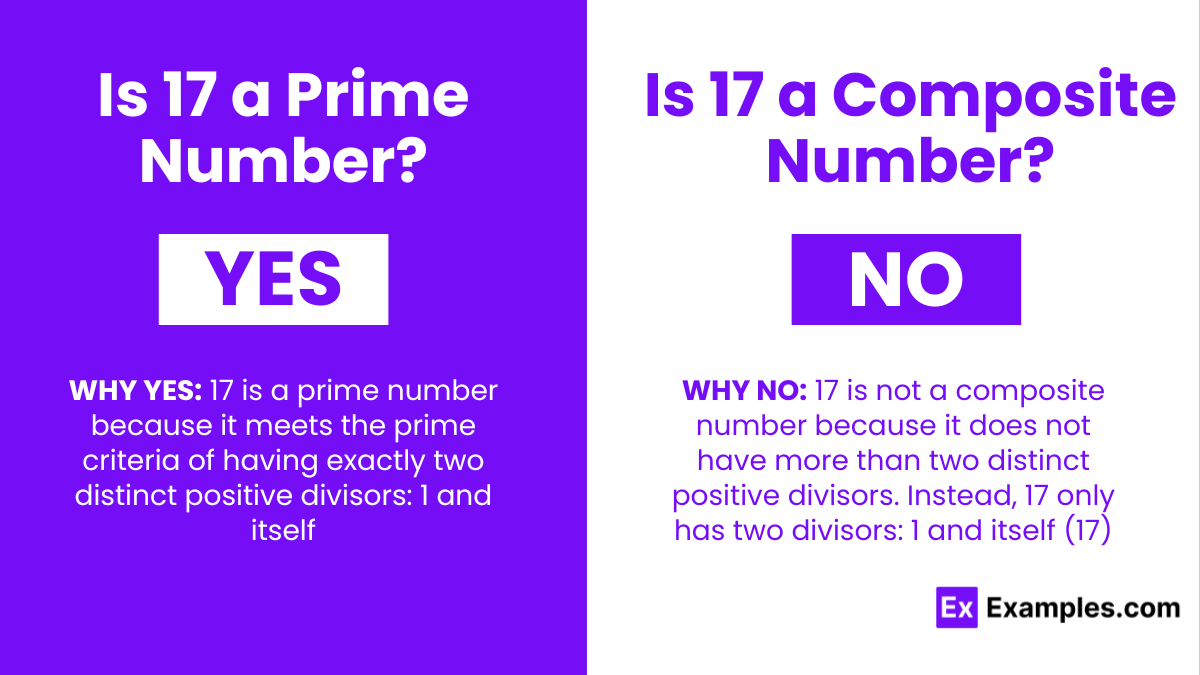Is 17 a prime number?
It is a composite number.
It is neither a prime nor composite number.
It is a prime number.
It is a negative number.


Yes – 17 is a prime number.
Why Yes: 17 is a prime number because it meets the prime criteria of having exactly two distinct positive divisors: 1 and itself. Instead of having multiple divisors like 16, 17 only has divisors 1 and 17. See any number if it’s prime number or not
No – 17 is not a Composite Number
Why No: 17 is not a composite number because it does not have more than two distinct positive divisors. Instead, 17 only has two divisors: 1 and itself (17).
| Property | Answer |
|---|---|
| Is 17 a prime number? | Yes |
| Is 17 a composite number? | No |
| Is 17 a perfect square? | No |
| Factors of 17 | 1, 17 |
| Multiples of 17 | 17, 34, 51, 68, 85, 102, 119, 136, 153, 170 |
| Cube Root of 17 | Not a whole number |
| Square of 17 | 289 |
| Square Root of 17 | approximately 4.123 |
| Is 17 a Perfect Square? | No |
| Is 17 a Perfect Cube? | No |
| Is 17 an Irrational number | No |
| Is 17 a Rational number | Yes |
| Is 17 a Real number | Yes |
| Is 17 an Integer | Yes |
| Is 17 a Natural number | Yes |
| Is 17 a Whole number | Yes |
| Is 17 an Even or odd number | No (17 is an odd number) |
| Is 17 an Ordinal number | Yes |
| Is 17 a Complex number | Yes (as all real numbers are also complex numbers) |
The factors of 17 are 1 and 17. These are the only numbers that divide 17 without leaving a remainder, which also indicates that 17 is a prime number.
17 is recognized as a prime number because it has exactly two distinct positive divisors: 1 and itself, specifically 1 and 17. This distinguishes it from composite numbers, which have more than two divisors. The number 17, while it may not have the same level of universal cultural symbolism as some numbers, holds its own unique significance in specific contexts. Being a prime number highlights the distinct mathematical properties of 17 and its role in the structure of numbers, underlining the deep connections between mathematics, culture, and natural phenomena.
Text prompt
Add Tone
10 Examples of Public speaking
20 Examples of Gas lighting
Is 17 a prime number?
It is a composite number.
It is neither a prime nor composite number.
It is a prime number.
It is a negative number.
Is 17 divisible by any number other than 1 and 17?
Yes, by 3.
Yes, by 2.
No, it is only divisible by 1 and 17.
Yes, by 5.
Which statement correctly identifies the nature of the number 17?
17 is a composite number because it has more than two factors.
17 is a prime number because it has exactly two distinct factors.
17 is neither prime nor composite
17 is a perfect square.
Which of the following numbers is similar to 17 in terms of being a prime number?
18
19
20
21
How can you determine if 17 is a prime number?
Check if it can be divided evenly by any number other than 1 and 17.
See if it has more than two positive factors.
Multiply it by any other number.
Add 1 to it and check if the result is prime.
What is the fundamental property of the number 17 in terms of its factors?
It has multiple factors including 1 and itself.
It is divisible by several numbers other than 1 and itself.
It has only two factors, 1 and itself.
It is divisible by 1 and every other number less than 17.
Which of the following numbers would be an example of a composite number?
17
19
21
23
Why is 17 not considered a composite number?
It has multiple factors.
It cannot be divided evenly by any number other than 1 and itself.
It is negative.
It is a decimal number.
Which property does the number 17 satisfy?
It is a composite number with factors of 2 and 3.
It is a prime number with only two factors.
It is divisible by 4 and 5.
It is neither prime nor composite.
Which characteristic is NOT true for a prime number like 17?
It has exactly two distinct positive factors.
It is divisible by numbers other than 1 and itself.
It cannot be factored into smaller positive integers other than 1 and itself.
It is not a multiple of any number other than 1 and itself.
Before you leave, take our quick quiz to enhance your learning!

